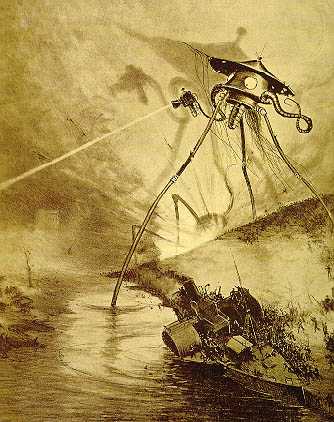 War of the Worlds, CW Edition
War of the Worlds, CW Edition
 For some time now I’ve been nibbling away at H. G. Wells’book, War of the Worlds — in CW! It is available along with several other books at the SKCC CW Learning Page. What a blast! It’s an effective way to improve your code speed, and it is so captivating that you want to keep coming back to it to find out what happens next. Somehow the story is all the more gripping as it unfolds slowly, letter by letter, giving you ample time to imagine the scenes that Wells describes.
For some time now I’ve been nibbling away at H. G. Wells’book, War of the Worlds — in CW! It is available along with several other books at the SKCC CW Learning Page. What a blast! It’s an effective way to improve your code speed, and it is so captivating that you want to keep coming back to it to find out what happens next. Somehow the story is all the more gripping as it unfolds slowly, letter by letter, giving you ample time to imagine the scenes that Wells describes.
Each chapter is one word-per-minute faster than the last one. So while it starts at a mere 10 WPM, if you finish the book you’ll be copying 36 WPM!
 A couple other features are helpful, too. For one thing it has punctuation marks that I’ve never learned before. It’s not everyday that you hear hyphens on the air, and the first time you hear an apostrophe or quotation-mark it will throw you for a loop. But you learn them quickly enough.
A couple other features are helpful, too. For one thing it has punctuation marks that I’ve never learned before. It’s not everyday that you hear hyphens on the air, and the first time you hear an apostrophe or quotation-mark it will throw you for a loop. But you learn them quickly enough.
Another thing I like is that Wells uses some expressions that are a bit antiquated. This helps keep you on your toes. On the air, it can be a help to anticipate the next word, but it can also be a hindrance — if you don’t hear what you expect to hear, it can take just enough milliseconds to get over the surprise that the whole word “rushes by like a freight train” (as my friend Keith describes code when it suddenly becomes opaque). By listening to War of the Worlds on CW, with its occasionally unfamiliar turns of phrase, you learn to temper your expectation so that you’re not thrown off.
All in all it’s a great way to hone your skills, and it’s way more enjoyable than the dry practice tapes I listened to ‘way back when!
Thank you to SKCC and especially to John Dunlap, KF7BYU, for making this book available!
Update: One ham has asked me for help on this. Currently the only way to listen to the files at http://www.skccgroup.com/learn/learn.php is to click on them one at a time, either listening to them one at a time online or right-clicking each one and saving them one at a time to put together in a playlist on your computer (That’s what I did, and it was a bit tedious.). If you would like to download a zipped file of the whole book, send me an email at N0IP@arrl.net and I’ll give you the link for as long as I can spare the disk space to keep the zipped file online.














War of the worlds in Morse !!!!
Great way to learn the code
The biggest problem with learning the code is the problem of AVOIDING BEING BORED TO DEATH’
War of the worlds in Morse !!!!
Great way to learn the code
The biggest problem with learning the code is the problem of AVOIDING BEING BORED TO DEATH’
My solution was to use a magazine as source material, but this is much better.
Dan
Cool
Thanks for the comments, Dan and Peter.
The further I get into this book, the more challenging it is. It is far more demanding than a short QSO. Let’s face it, even a 10 WPM operator can handle at least 20 WPM if it’s nothing but a lightning-fast 5NN TU from a DXpedition, and he can probably get away with at least 13 WPM as long as he doesn’t have to copy more than RST, Name, and QTH. (Notice how we can copy so much faster than normal when using RufzXP — it sends nothing but one call sign at a time!) But rag-chewing is much more demanding. That’s where this book really comes in handy — it demands more of us than the usual first few rounds of a QSO.
It is amazing how big a difference just one word per minute can make! I find myself looking at how much of the chapter I have left, hoping that it is long enough to prepare me for the next one, and the next jump of one WPM.
This sounds like just what I need tnx 73